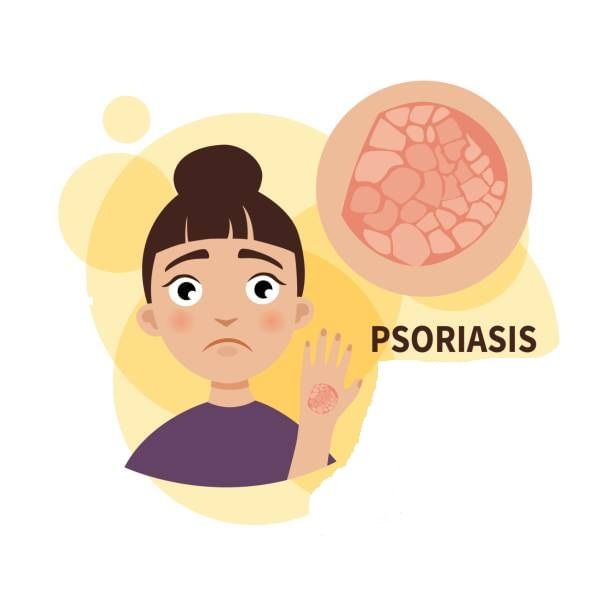Psoriasis - The Skin Troublemaker!
Psoriasis is a common, chronic skin condition caused by an overactive immune system that speeds up the life cycle of skin cells making the cells to build up rapidly on the surface of the skin. The extra skin cells form scales and red patches that are itchy and sometimes painful.
Symptoms:
- Red patches of skin covered with thick, white, silvery scales
- Small scaling spots (commonly seen in children)
- Flaking
- Dry, cracked skin that may bleed
- Itching, burning or soreness
- Thickened, pitted or ridged nails
- Swollen and stiff joints (psoriatic arthritis)
Psoriasis patches can range from a few spots to major eruptions that cover large areas.
Most types of psoriasis go through cycles, flaring for a few weeks or months, then subsiding for a time or even going into complete remission.
Types of psoriasis:
- Plaque psoriasis. The most common form, plaque psoriasis causes dry, raised, red skin lesions (plaques) covered with silvery scales. The plaques might be itchy or painful and there may be few or many. They can occur anywhere on your body, including your genitals and the soft tissue inside your mouth.
- Nail psoriasis. Psoriasis can affect fingernails and toenails, causing pitting, abnormal nail growth and discolouration. Psoriatic nails might loosen and separate from the nail bed (onycholysis). Severe cases may cause the nail to crumble.
- Guttate psoriasis. This type primarily affects young adults and children. It's usually triggered by a bacterial infection such as strep throat. It's marked by small, water-drop-shaped, scaling lesions on your trunk, arms, legs and scalp.
The lesions are covered by a fine scale and aren't as thick as typical plaques are. You may have a single outbreak that goes away on its own, or you may have repeated episodes.
- Inverse psoriasis. This mainly affects the skin in the armpits, in the groin, under the breasts and around the genitals. Inverse psoriasis causes smooth patches of red, inflamed skin that worsen with friction and sweating. Fungal infections may trigger this type of psoriasis.
- Pustular psoriasis. This uncommon form of psoriasis can occur in widespread patches (generalized pustular psoriasis) or in smaller areas on your hands, feet or fingertips.
It generally develops quickly, with pus-filled blisters appearing just hours after your skin becomes red and tender. The blisters may come and go frequently. Generalized pustular psoriasis can also cause fever, chills, severe itching and diarrhoea.
- Erythrodermic psoriasis - The least common type of psoriasis, erythrodermic psoriasis can cover your entire body with a red, peeling rash that can itch or burn intensely.
- Psoriatic arthritis - In addition to inflamed, scaly skin, psoriatic arthritis causes swollen, painful joints that are typical of arthritis. Sometimes the joint symptoms are the first or only manifestation of psoriasis or at times only nail changes are seen. Symptoms range from mild to severe and psoriatic arthritis can affect any joint. Although the disease usually isn't as crippling as other forms of arthritis, it can cause stiffness and progressive joint damage that in the most serious cases may lead to permanent deformity.
Psoriasis triggers:
- Infections, such as strep throat or skin infections
- Injury to the skin, such as a cut or scrape, a bug bite, or a severe sunburn
- Stress
- Smoking
- Heavy alcohol consumption
- Vitamin D deficiency
- Certain medications — including lithium, which is prescribed for bipolar disorder, high blood pressure medications such as beta-blockers, antimalarial drugs, and iodides
Risk factors:
- Family history
- Viral and bacterial infections
- Stress
- Obesity
- Smoking
Homoeopathic treatment:
1. Arsenic Album - Dry, rough, red papular eruptions with silver scales. Cold worsens the itching. Burning pain after scratching. Restlessness with anxiety.
2. Graphites Naturalis - An inclination to develop cracks on the surface may also be there. Stickiness following scratching.
3. Arsenic Iodatum - Shedding of large scales from the skin eruptions. The skin is covered with inflamed patches with scales on them. There is persistent itching in the patches and the shedding of the scales leaves raw skin behind.
4. Sulphur - Severe itching and burning, scratching the skin until it bleeds. Symptoms tend to get worse in the evening and at night, when in bed.
5. Petroleum - Deep cracks appear on the skin. There is a burning sensation and intolerable itching on the affected skin. Bleeding may also be present in the cracks. The skin is intensely sore, painful, hard, fissured and slow to heal. A crawling sensation on the skin may also be present.
Other remedies: Sepia, Merc sol, Psorinum, Kali ars, Antim crud etc.



+1.svg)
